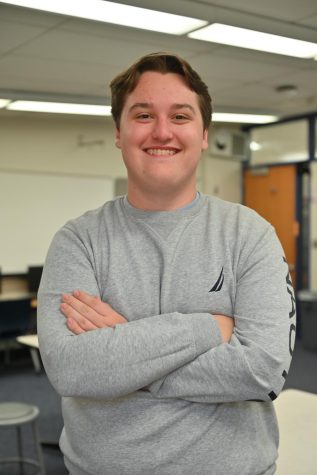Superintendent Hears Concerns
November 22, 2021
Just one day after students walked out in response to racially charged vandalism, students in Dan Kelty’s second block Spanish class wrote a letter to Superintendent Keith Marty. Over a month later Marty visited the class and responded to their letters in person.
The morning after the Sept. 23 walkout, students came into Kelty’s class with many emotions. Throughout the period, students had an open dialogue about the protest. They discussed the progress they wanted to see after the walkout. After the nearly hour long conversation, Kelty proposed a way for the students to take their complaints to the administration: writing letters. After all the letters were submitted he sent them off to the superintendent.
“I was hoping he would read them, I thought … he might look at a couple of them, and I would never hear back from him, but at least the students would have had the experience of saying,” what they believe Kelty said.
But after he sent them he heard back from Dr. Marty, he expressed an interest in wanting to visit the class.
“He came because he didn’t want to just ignore all these letters and he wanted to address them personally, he originally wanted to come much earlier,” said Kelty. After a few delays and much anticipation. A date was set: Oct 27. As the day approached students began to think of the best way to express their feelings.
At 7:30 a.m. on Sept. 24, when students entered the room, Marty was sitting in the front. The discussion began with Marty introducing himself. He told the class he had received their letter and that he wanted to respond. Instead of writing multiple letters he thought it would be better to respond to the class, as a whole, in person. He discussed privacy laws with the class and said that the district was not able to reveal names or punishment due to these laws and also discussed Supreme Court cases such as Tinker v. Des Moines. He explained that the case gave students the right to due process. After he described the limits on what he could say, he opened the conversation to student questions.
The general question that was repeatedly asked was why they can’t release the punishment of the student.
“I felt like he switched gears a little bit. It felt like it was going in a circle,” Izzy Herberger said, who was one of the students involved with asking the questions. “I kind of felt like he wasn’t really listening…he was missing the point entirely.”
“He spoke in a very broad sense, and he didn’t speak about anything I thought was truly important,” said Jackson, another student who participated in the dialogue. The students felt that Marty tried to change the subject often instead of answering the questions. Multiple times he discussed drug and weapon offenses despite student requests to remain on topic. At one point, out of frustration, Jackson asked him to stay on topic.
One student spoke up and asked Marty if they could know the process by which students can be expelled or suspended. He had discussed how students who are suspended go to a disciplinary facility outside of school. He also told them that a disciplinary committee, consisting of rotating administrators, would hear issues and then give the superintendent a recommendation of what action can be taken. They are given a list of prior disciplinary actions taken so that the committee can make the best decision.
“The impression that he gave off is he doesn’t believe it is a problem within school, he thinks that it is a society problem and there is not a lot that school can do to prevent future acts,” said Jackson.
The students pressed Marty for a statement from the district that clearly shows that racism is not allowed in the Parkway School District, but unlike prior statements they wanted a clear plan laid out to show how they are changing. They decided that a sort of assembly would be a good way for the district to show the change.
“I think that there is potential for [action] but I do not think any real action will come and if it does it will not be in the form we were asking for,” Herberger said.
He said that he may be able to release a normal disciplinary action taken for students who commit similar acts. Throughout the conversation, students pushed for an assembly to discuss race, as has happened with prior racist events. In the end, Marty said that he would discuss the conversation with Principal Tim McCarthy.
After the conversation students were surveyed about the conversation. 75% of students were unsatisfied with Marty’s answers. Nearly 87.5% said they didn’t believe that change will come from the conversation.
“I was very proud of my students,” said Kelty.

